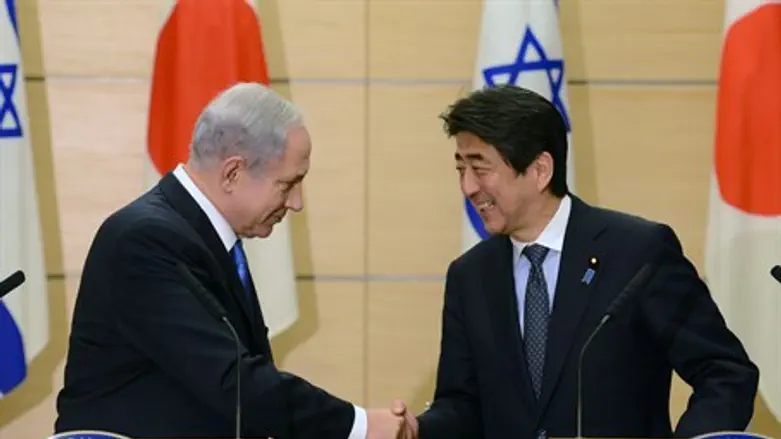
Japanese Prime Minister Shinzo Abe will make an historical visit to the Middle East starting this Friday through next Wednesday, with Israel featuring prominently as bilateral ties between the two nations continue to show signs of taking off.
Abe's is the first visit by a Japanese prime minister to Israel in almost a decade, since then-Prime Minister Junichiro Koizumi visited in July 2006, and is also Abe's first official international trip since being re-elected last month in snap elections that solidified his power.
While visiting the Jewish state, Abe is to meet with Prime Minister Binyamin Netanyahu and discuss strengthening cooperation in implementing measures to fight cyber terrorism, as well as strengthening economic ties, reports the Japanese-language Sankei News.
He is likewise to visit the Yad Vashem Holocaust Memorial and to give a speech on the growing relations between the two countries
Accompanying Abe to Israel will be roughly 30 private companies indicating the ever-growing push for bilateral economic ties. The Japanese prime minister is also to attend meetings of economists, and intends to announce plans to develop and expand mutual investments.
The visit is highly meaningful, particularly given that the Israeli Cabinet just last Sunday approved a landmark plan by Netanyahu to expand ties with Japan in all fields, in a three-year project that represents an investment of millions of shekels and involves numerous governmental ministries.
Abe's Middle East visit will start in Egypt, then go on to Jordan, Israel and the Palestinian Authority (PA) controlled territories.
During his first stop in Egypt, Abe is to give a speech on Japan's desire to contribute to peace and stability in the Middle East including aid in rebuilding Gaza, as well as its intentions to contribute and coordinate with other countries in the "war on terror," particularly following the horrific attacks in France last week.
Abe has pledged to cooperate in fighting terrorism, including the battle against Islamic State (ISIS) terrorists. That more active military stances comes as Abe has been pushing to change article nine of the Japanese constitution so that Japan can engage in war, and not just defensive campaigns to protect the island nation.
Israel-Japan ties have been going through a renaissance since last year, including Netanyahu's May visit to Japan, the signing of an Industrial R&D Agreement in July - the first such agreement Japan has signed, a visit last October by Japan's Deputy Foreign Minister, and an official Israeli delegation visit to Japan last November.